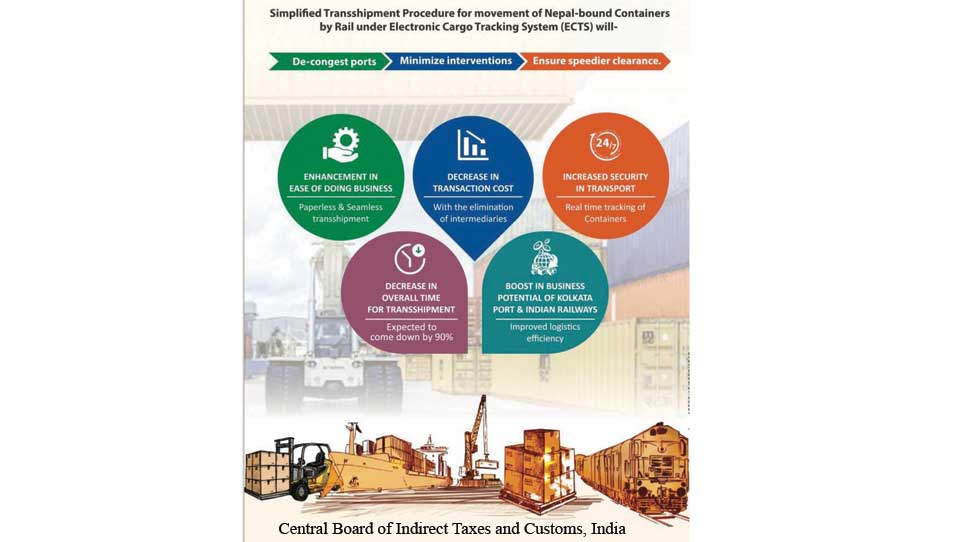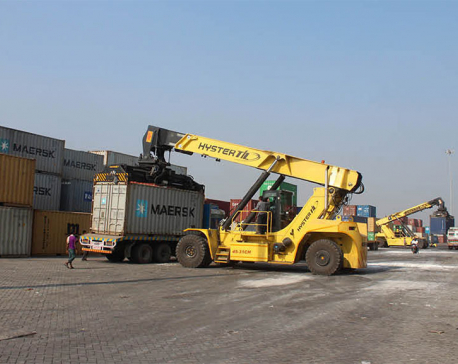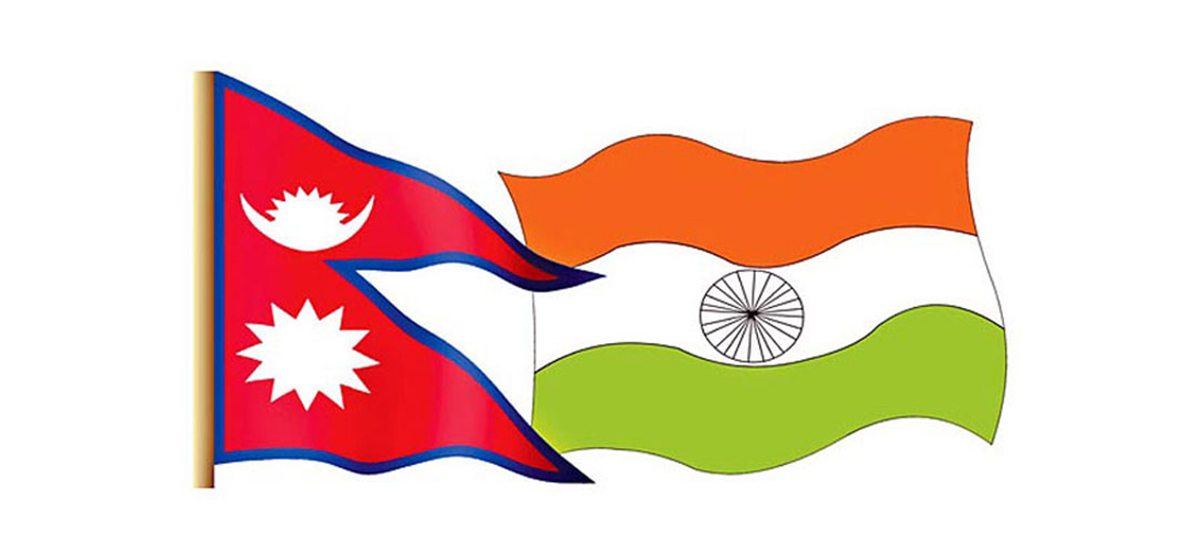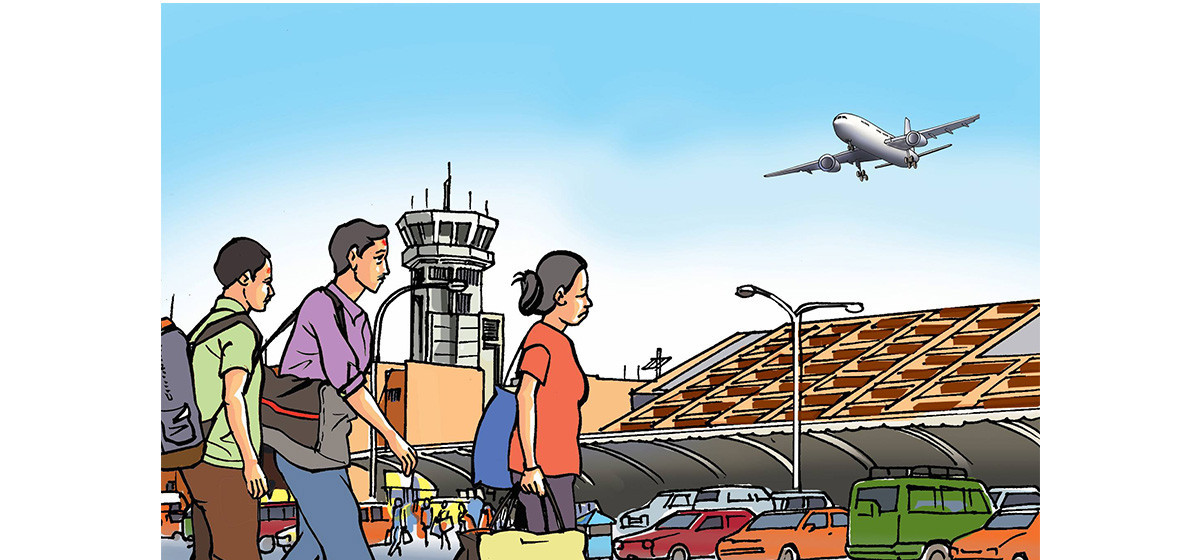
OR
Electronic cargo tracking on Nepal-bound cargoes flags off
Published On: February 17, 2019 09:41 AM NPT By: Republica | @RepublicaNepal

KATHMANDU, Feb 17: Nepal-bound cargoes from Kolkata/Haldia port of India have now come under Electric Cargo Tracking Service (ECTS), starting from Friday.
The first cargo train with the electronic tracking system equipped with the newest technology was inaugurated by Vinit Kumar, chairman of Kolkata Port Trust and Ek Narayan Aryal, Kolkata-based commissioner for customs and consul general of Nepal. The new transshipment procedure is introduced as a pilot project in the rail route from Kolkata/Haldia to Birgunj dry port.
The implementation of new technology brings with it features like tracking functionality, high-security electronic locks and a faster rate of transshipment procedure that helps to control possible misuse of supplies along the route.
This is also expected to significantly reduce the time taken for transshipment procedure, which is expected to come down by 90 percent, according to India’s Central Board of Indirect Taxes and Customs, responsible for administering indirect taxes for the Government of India.
Under the newly introduced modality, Nepali traders and importers will also benefit from the added advantage of not having to file Transit Declaration, which significantly decreases bureaucratic hurdles for traders. The importers and traders are also optimistic that the new mechanism will rid them off demurrage charges in the ports.
The high-security electronic lock, a feature of ECTS, will also enhance the ease of doing business for traders and importers in the country by reducing the cost by decreasing the number of intermediaries when bringing cargoes to Nepal.
The implementation of the new technology is also expected to increase security for the goods in Nepal-bound cargoes due to the added feature of real-time tracking of the containers.
Alongside, the improved logistics tracking will also help in decongesting the hub in Kolkata and also increase the efficiency of the Indian Railways.
Implementation of ECTS procedure will also help the Government of Nepal by reducing transit monitoring operation cost, and also help in enhancing enforcement of cargo handling regulations.
The development in trade mechanism is a result of a bilateral meeting between the two governments that was organized to discuss the viability of implement ECTS System to the trade between two countries. The meeting, which was held in collaboration with Asian Development Bank (ADB) in June last year in Mumbai, included senior officials from the concerned government agencies from India and Nepal.
The recent implementation of improved transshipment technology will further enhance the trade relationships between India and Nepal and will also bolster the commitment of the Indian government to improve transit facilities for Nepali trade.
Previously, Nepal-bound cargoes from Vishakhapatnam Port were using ECTS technology since August.
You May Like This

Over hundred rakes imported via Birgunj dry port in a month
BIRGUNJ, Aug 27: When the dry port came into operation at Sirsiya of Birgunj in the Fiscal Year 2004/05 only... Read More...

Customs formalities for Nepal bound cargoes at Indian ports to ease
BIRGUNJ, April 23: Preparations are underway to lift customs procedures from Nepal's third country imports coming via Indian ports. ... Read More...

Indian port officials vow to ease shipment of Nepal-bound cargoes
KATHMANDU, Aug 6: Authorities of Kolkata and Vishakapatnam, which is also known as Vizag, ports of India have expressed commitment... Read More...





Just In
- Weather expected to be mainly fair in most parts of the country today
- 120 snow leopards found in Dolpa, survey result reveals
- India funds a school building construction in Darchula
- Exploring opportunities and Challenges of Increasing Online Transactions in Nepal
- Lack of investment-friendly laws raises concerns as Investment Summit approaches
- 550,000 people acquire work permits till April of current fiscal year
- Fixing a win by outlawing dissent damages democracy
- MoHP cautions docs working in govt hospitals not to work in private ones











_20220508065243.jpg)
Leave A Comment